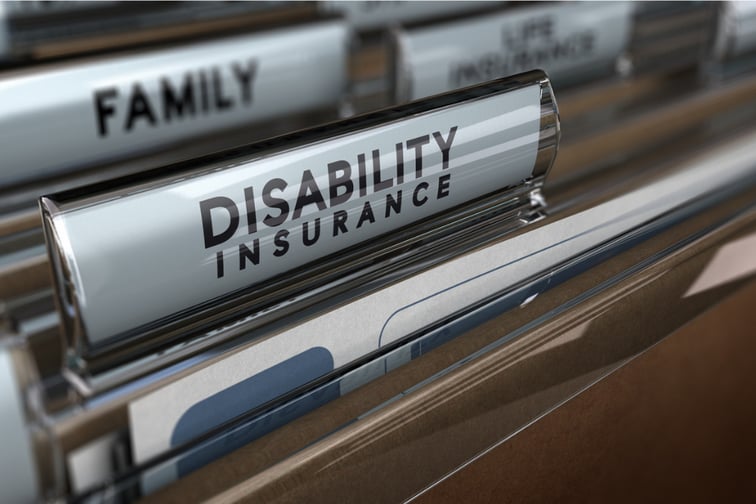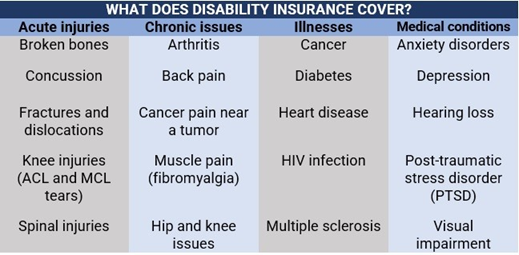

Most of us take out insurance for what we consider our most prized assets – our homes, our cars, and other expensive possessions. Not many of us realize, however, that our most important asset – the one that allows us to maintain our living standard and, therefore, needs protection the most – is our ability to earn income.
Disability insurance provides coverage for this vital asset.
In this article, Insurance Business gives you a rundown of what disability insurance covers, how the different types of policies work, and which demographic needs this type of coverage the most. If you’re looking for a plan that will best protect you financially if circumstances take away your ability to work, this piece can serve as a useful guide. For the insurance professionals who typically read our website, use this as a guide for clients who have questions about disability insurance.
Disability insurance is a type of policy that pays out a portion of your income if an unexpected illness or injury prevents you from working and earning a living. Coverage may be available through your employer, the government, or private insurers.
There are two main types of disability insurance policies, according to the Insurance Information Institute (Triple-I). These are:
Plans that combine short-term and long-term benefits are also available. In this type of policy, long-term coverage takes effect after short-term disability insurance runs out. If you plan on taking out a long-term policy, you can customize your plan and access additional benefits in the form of riders. These add-ons, however, have a corresponding impact on premiums.
Similarly, you can use other types of policies:

Disability insurance serves as a partial replacement for your income if you’re unable to work due to sudden illness or injury. It can help pay for your daily living expenses. These include:
If you’re in the US, you can also access two types of federal disability programs under the Social Security Administration (SSA):
These programs, however, often have strict eligibility requirements. These include providing proof that:
Disability insurance covers most injuries and illnesses, even those that are not covered by workers’ compensation insurance. Some people, however, have a skewed perception of what a disability is, believing that it only applies to severe conditions such as paralysis from an accident or stroke. In reality, many types of disabilities are caused by common health conditions. These include:
The table below lists several examples of medical conditions that disability insurance typically covers.

Although disability insurance covers a range of medical and health conditions, there are certain exceptions that are not covered:
One thing to take note of is that different policies have varying coverages and exclusions, so it pays for you to carefully read your policy document to understand what you are covered for.
Each insurer defines a disability differently, so they also impose varying requirements that a policyholder must meet before coverage kicks in. Here are the two most common definitions used by disability insurance providers.


If you’re struggling to make sense of different insurance buzzwords, our glossary of insurance terms can help you.
Most of the time, when we think of instances that lead to disability, we picture devastating accidents that cause serious bodily harm. But in reality, most long-term disabilities that force people to miss significant time from work are due to common illnesses – and they happen far more often than you think.
The latest data from the SSA reveals that about a quarter of young people are likely to experience a disabling event at some point in their careers that will cause them to miss work for at least a year. Not having a stable source of income during that period can put families in dire straits.
Just like in other types of policies, premium prices for disability insurance are determined by a range of factors. These include:
Curious about how insurance premiums work in different policies? Check out our comprehensive insurance premium guide.
Most disability insurance providers give you access to income protection calculators to help you work out how much coverage you need. Some insurers also offer different figures ranging from 40% to 80% of your after-tax income.
Ultimately, however, you will have to strike a balance between what you can afford to pay and the amount you will need to receive to meet daily living expenses should you become disabled.
According to Triple-I, there are two protection features in disability insurance plans that you as a policyholder needs to understand. These are:
Here are some other options that you need to consider when buying disability insurance.
If you have people depending on you financially, purchasing disability insurance can be worth it. Accidents and illnesses strike when you least expect them, and these can adversely impact your ability to earn a living. Having disability coverage can ease some of the financial strain of not being able to receive your normal paycheck until you are physically able to perform your job again.
Disability insurance also works best with the right health insurance plan. If you’re searching for health plans within your budget, you can find everything you need to know about affordable health insurance in this Insurance Business guide.
Which jobs do you think need disability insurance the most? Talk to us in the comments section below.
